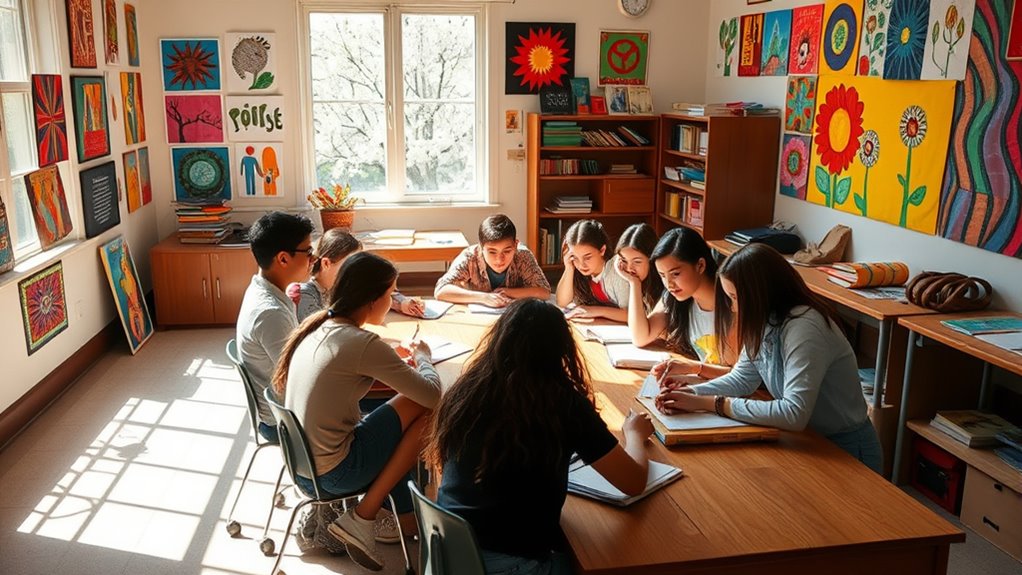Poetry and writing workshops are perfect for teens like you to express emotions and explore your identity. These workshops enhance your writing skills, boost self-esteem, and build a supportive community. You’ll engage in free-writing exercises, receive constructive peer feedback, and learn to articulate your thoughts effectively. The structured environment nurtures creativity and encourages diverse voices. If you’re curious about how these opportunities can shape your writing journey, there’s much more to discover about their benefits.
Key Takeaways
- Poetry and writing workshops provide a safe space for teens to explore emotions and express their identities through creative writing.
- Participants engage in free-writing exercises, which encourage creativity and help reduce self-censorship.
- Workshops offer constructive peer feedback, boosting writing confidence and enhancing social skills.
- Inclusive environments foster diverse narratives, ensuring all voices are represented and valued.
- Consistent practice in workshops cultivates writing habits and prepares teens for future academic and professional opportunities.
The Importance of Creative Expression in Teen Development

Creative expression plays an essential role in your development as a teenager, as it serves not only as an emotional outlet but also as a means to explore your identity and build confidence.
Engaging in creative activities helps you process complex feelings while reducing stress and anxiety, acting as a therapeutic tool. As you articulate your emotions through art or writing, you boost your self-esteem and solidify your sense of self. Furthermore, this form of expression enhances emotional well-being by allowing you to explore and articulate feelings in a controlled environment.
These creative pursuits encourage resilience, making it easier to adapt to challenges. Additionally, sharing your work fosters a sense of accomplishment, enhancing your confidence.
Ultimately, the freedom to express yourself creatively nurtures your independence and helps you develop a unique voice and personal style.
Key Benefits of Participating in Poetry Workshops

While you may not realize it at first, participating in poetry workshops can considerably enhance your creative journey.
These workshops offer a unique platform for you to explore and express your emotions, fostering your individual voice through diverse poetic forms. Engaging in free-writing exercises helps you release creativity and reduces self-censorship. In particular, the Poets House Academy provides a week-long immersive experience that allows you to delve deeper into poetry with guidance from esteemed poets. Additionally, creating a supportive community can further enhance your artistic expression and growth. In this environment, you can also discover the importance of strong communication skills, which are essential for articulating your thoughts and feelings effectively.
You’ll also improve your literary skills by receiving constructive feedback from peers, honing your understanding of audience perception, and boosting your overall writing confidence.
Beyond creativity, workshops cultivate social skills, promoting active listening and respectful critique. They create a supportive atmosphere that enhances your emotional well-being, helping you process complex feelings.
Ultimately, these experiences can prepare you for future opportunities in writing and beyond.
Structure and Format of Effective Writing Workshops

Effective writing workshops thrive in a structured environment that balances creativity with clear expectations.
Begin by choosing a welcoming space where participants feel comfortable sharing their work. Arrange seating in a circle to foster open discussion and inclusivity. Set a clear schedule, allocating time for introductions, lessons, and independent writing.
Start each session with a focused teaching point, then engage participants in peer reviews to enhance feedback quality. Incorporate warm-up activities to spark creativity and use specific writing prompts to challenge their skills. Workshops should encourage constructive feedback among participants to enhance their writing skills.
Rotate moderation roles among participants to enrich perspectives, and maintain a respectful atmosphere during critiques. This structured approach not only nurtures creativity but also helps participants grow as writers.
Fostering Accessibility and Inclusivity in Creative Writing

Fostering accessibility and inclusivity in creative writing means recognizing the diverse backgrounds and abilities of all participants. You can create a welcoming environment by using language that avoids bias related to gender, race, age, and ability, fostering a sense of belonging.
Implement practical strategies to identify and eliminate unconscious biases in your writing. Establish guidelines that promote awareness of common mistakes hindering inclusivity. Leverage technology tools to adapt content, ensuring it’s engaging for everyone.
Encourage diverse narrative representation by supporting writers from underrepresented backgrounds, enriching your workshops. Finally, regularly solicit feedback from participants to identify barriers and improve accessibility. Additionally, consider utilizing inclusive language in your writing to further enhance engagement and understanding among all participants.
Exploring Different Types of Poetry and Writing Workshops

As you immerse yourself in the world of poetry and writing workshops, you’ll discover a rich tapestry of styles that can ignite your creativity and self-expression.
Different types of poetry, like haikus with their nature-focused brevity, free verse that allows unrestricted flow, and sonnets exploring themes of love, provide unique avenues for exploration. You might enjoy the humor of limericks or the thematic depth of acrostics.
Workshops often guide you through these forms, encouraging emotional expression and broadening your literary understanding. Engaging in discussions, timed writing exercises, and peer feedback helps you refine your voice and style.
These experiences not only enhance your writing skills but also build your confidence in sharing your creative work with others.
Enhancing Skills for Future Writing Endeavors

Enhancing your writing skills is essential for future endeavors, and it starts with consistent practice. Write every day, even if it’s just for a few minutes.
Engage in creative writing exercises to develop new techniques and styles, pushing you to think outside the box. Explore various genres to expand your writing abilities, as reading exposes you to different styles.
Establish a routine, whether daily or weekly, to turn writing into a habit. Keeping a journal or using note-taking apps can help you organize thoughts and refine your skills.
As you practice, you’ll not only improve your writing but also build confidence, making you more prepared for academic and professional challenges ahead.
The Role of Community and Peer Feedback in Workshops

While diving into the world of creative writing, you’ll find that community and peer feedback play a crucial role in your development as a writer. Engaging with peers enhances your work by providing diverse perspectives that improve clarity and coherence. Constructive criticism helps you identify strengths and weaknesses, fostering personal growth.
As you participate in structured workshops, you’ll develop effective communication skills and build confidence in sharing your writing. The supportive atmosphere encourages you to express yourself freely, reducing performance anxiety and making feedback a normal part of the process.
Furthermore, these workshops create a sense of belonging, fostering trust and motivation among participants. Ultimately, the relationships formed here can propel your writing journey forward. In these environments, emotional disconnection can be addressed through collaborative projects that promote deeper connections among writers.
Inspiring Young Writers: Opportunities and Networking

Building on the community and feedback you’ve experienced in workshops, now’s the perfect time to explore the myriad opportunities available to young writers. Organizations offer scholarships for underrepresented voices, and mentorship programs like Curtis Brown Creative provide personalized guidance from published authors. Engage with resources from Young Writers to keep your passion alive through secondary education. Additionally, consider the various funding options that can help support your writing projects. Early exposure to STEM education can also cultivate critical thinking and problem-solving skills that benefit creative endeavors. Moreover, incorporating mental clarity techniques can enhance your focus and creativity while writing.
Sustainable living practices, such as reducing waste, can inspire fresh perspectives and themes in your writing. Consider entering competitions like Fright Club, where you can showcase your work alongside peers. Online communities, such as Write the World, offer prompts and contests, connecting you with writers globally.
Networking through local events and collaborations fosters relationships that can enhance your skills and creative journey. Seize these opportunities to inspire your writing and build a supportive network. Additionally, the power of imagination mobilizes mental potential, allowing young writers to unlock their creativity and express themselves fully.
Frequently Asked Questions
What Age Groups Are Typically Targeted in Poetry Workshops for Teens?
You’ll find that poetry workshops for teens typically target ages 13 to 18, with some focusing specifically on 15 to 18-year-olds.
These age groups allow participants to explore complex themes like ambition and belonging.
Workshops often welcome anyone from 13 to 19, providing a broad range for young writers.
Are There Any Prerequisites for Joining a Poetry Workshop?
Stepping into a poetry workshop is like entering a vibrant garden of creativity, where your voice can bloom without constraints.
You don’t need previous experience; most workshops welcome you with open arms, emphasizing exploration over skill.
While some may suggest familiarizing yourself with poetic forms, it’s all about finding your unique expression.
Just bring your notebook and an open mind, and let the magic of words guide you through this artistic journey.
How Can Parents Support Their Teens in Poetry Workshops?
To support your teen in poetry workshops, create a quiet writing space at home and encourage regular writing routines.
Celebrate their efforts by providing positive feedback and sharing your own writing experiences.
Attend poetry events together to show your interest and foster a love for the genre.
Suggest different writing prompts to spark creativity and encourage them to explore their emotions through poetry, making the process fun and engaging.
What Materials Are Usually Required for Participation in Workshops?
To participate in workshops, you typically need a few essential materials. Grab handbooks or guides that cover fundamental writing concepts.
You’ll also want access to interactive platforms for engagement and templates for organizing your work. Consider resources for writing activities, like structured poem templates and free writing exercises.
Finally, have computers or tablets ready for research and online collaboration, along with audio materials for inspiration. These tools will enhance your workshop experience!
How Do Online Workshops Differ From In-Person Sessions?
Online workshops offer convenience, flexibility, and broader reach compared to in-person sessions. You can join from anywhere, learn at your own pace, and connect with diverse participants.
However, you might experience screen fatigue and limited social interaction. While technology enables versatile feedback and varied learning styles, it requires reliable internet.
Ultimately, online workshops adapt to your needs, providing a unique environment that fosters creativity while encouraging self-directed progress in your learning journey.
Conclusion
In the journey of self-discovery, poetry and writing workshops are your guiding stars, illuminating the path to creative expression. By embracing these opportunities, you’ll not only hone your skills but also weave connections with fellow aspiring writers. Each word you pen becomes a brushstroke on the canvas of your identity, shaping your voice and confidence. So, plunge into and let your imagination soar—your story is waiting to be written, and the world is enthusiastic to hear it.









